Postpublished at 13:22 BST 24 April 2015
Kate Benyon-Tinker
BBC Middle East producer
tweets, external: Now the Prince of Wales also lays a wreath at the Abide memorial #Gallipoli100
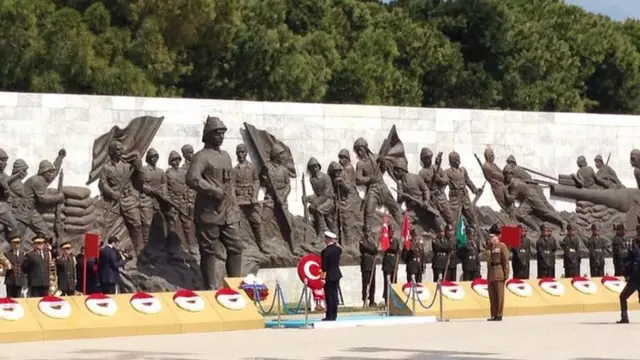
Events mark the 100th anniversary of the Gallipoli campaign, one of the bloodiest in World War One
Allied forces landed on the beaches of the Gallipoli peninsula in modern-day Turkey in April 1915
Allied forces were locked in an eight-month stalemate with Ottoman troops before pulling out in January 1916
An estimated 131,000 soldiers on both sides of the conflict died during the doomed campaign
It was the first campaign that led to major casualties for Australian and New Zealand forces during the war
Leaders of Australia, New Zealand and Turkey, and Princes Charles and Harry, are among those attending remembrance services
Stephen Robb, Henrietta McMicking, Claire Bates and Jastinder Khera
Kate Benyon-Tinker
BBC Middle East producer
tweets, external: Now the Prince of Wales also lays a wreath at the Abide memorial #Gallipoli100

Kate Benyon-Tinker
BBC Middle East producer
tweets, external: #Turkey's President Erdogan lays a wreath at the Turkish memorial at Abide #Gallipoli100
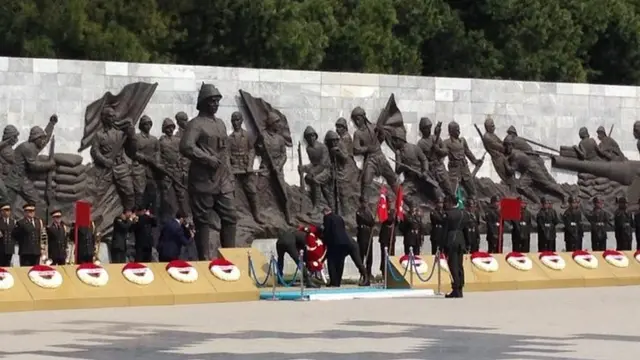
Kate Benyon-Tinker
BBC Middle East producer
tweets, external: Turkish President Erdogan arrives at International Service at Abide. Nearly 40 countries represented #Gallipoli100
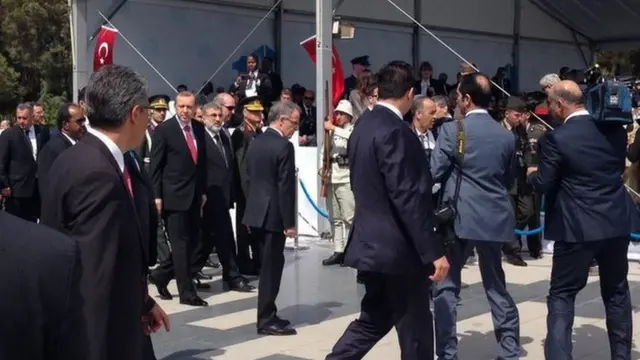
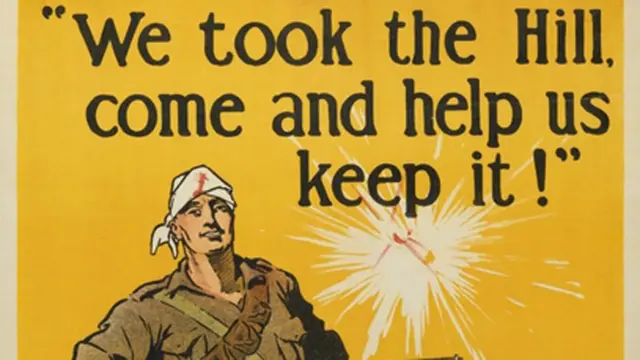 Image source, AWM
Image source, AWMAn Australian recruiting poster for World War One
Gallipoli stretched the Allies' already limited resources. It became the focus for recruitment in Australia and New Zealand, because it was their first World War One campaign.
Propaganda was used to idealise Anzac soldiers, and their achievements at Gallipoli, though impressive, were inflated while disasters were minimised.
 Phil Mackie
Phil Mackie
BBC News correspondent
tweets, external: Security cordon now around Helles #Gallipoli100
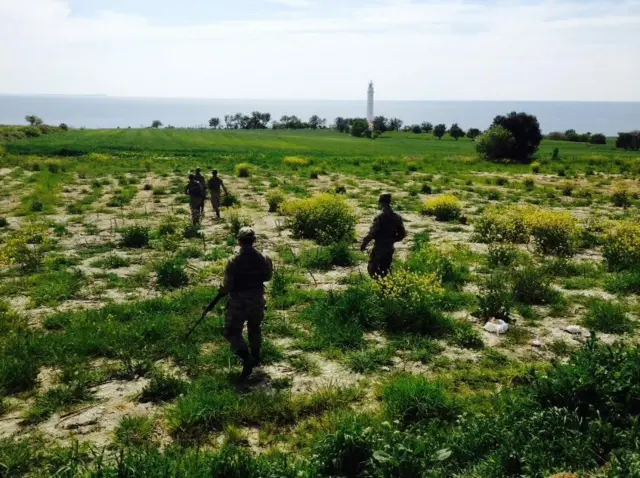
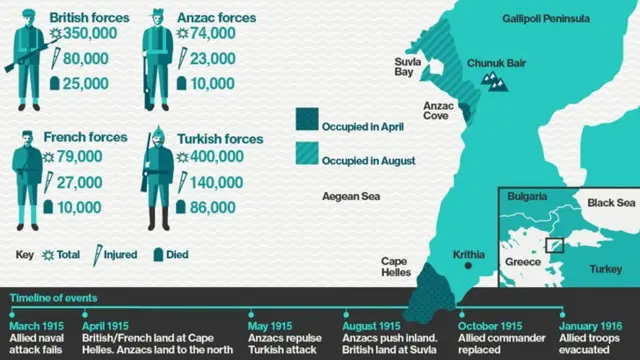 Image source, BBC iWonder
Image source, BBC iWonderSoldiers from Britain, Canada, India, Australia, New Zealand, France and the French African colonies all took part. They were opposed by Turkish troops under the command of both Turkish and German officers.
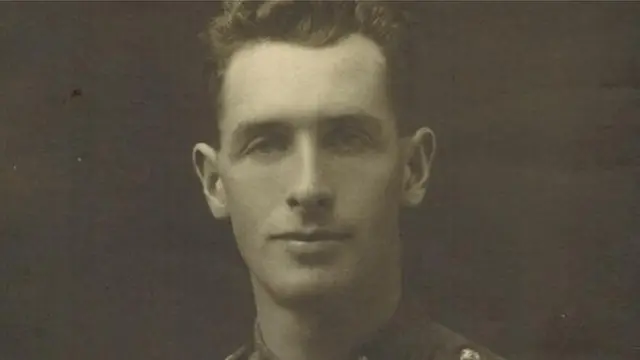 Image source, Ailsa Siemens
Image source, Ailsa SiemensFamilies from all over the world are gathering to remember those who served at Gallipoli.
More than 30,000 Australians visit the Turkish peninsula every year.
Pte Eric Smith served in the 3rd Scottish Horse, part of the 2nd Mounted Division, and landed at Suvla Bay in late August 1915.
His daughter Ailsa Siemens describes how they were 250 strong when they went out, but on their return they numbered just 18. Eric was one of the lucky survivors.
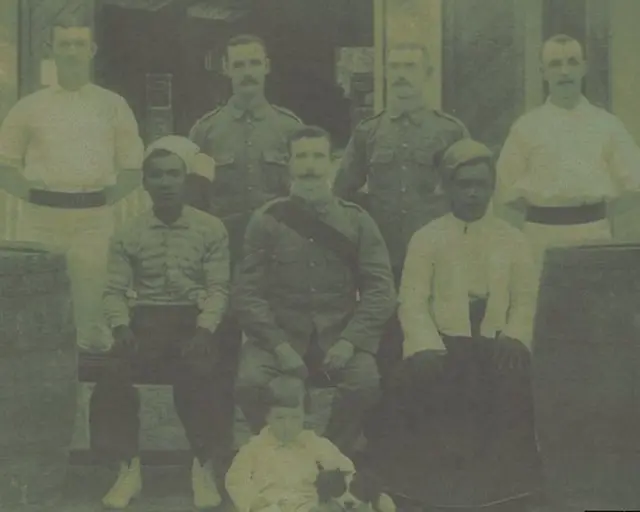 Image source, Jayne Lamb
Image source, Jayne LambJayne Lamb's great-grandfather, William Percival, died at Gallipoli. In this photograph he is sitting in the middle with his son Arthur seated in front of him.
You can read more recollections from families here.
Kate Benyon-Tinker
BBC Middle East producer
tweets, external: The international service starting to get underway at the Turkish memorial Abide #Gallipoli100
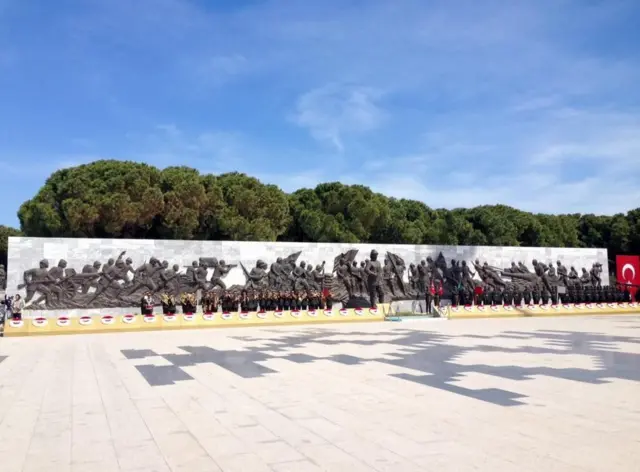
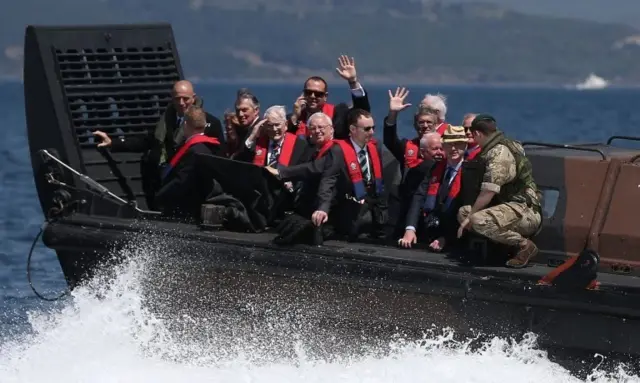 Image source, PA
Image source, PAAfter attending a reception on board HMS Bulwark in the Dardanelles strait, the group of British descendants were transported to shore by landing craft.
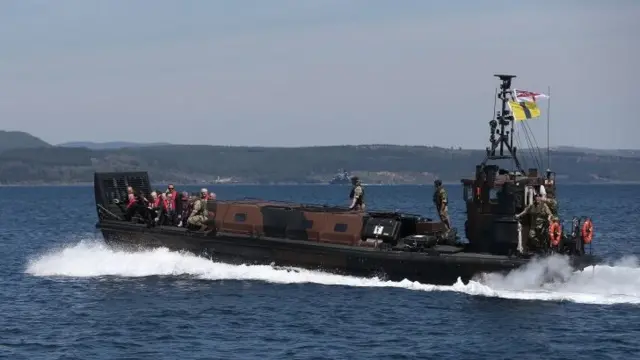 Image source, PA
Image source, PA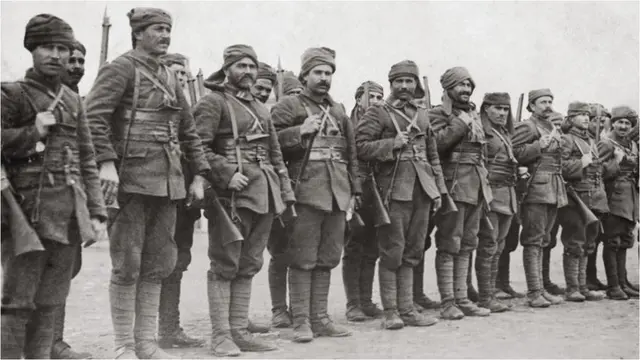 Image source, Getty Images
Image source, Getty ImagesTurkish troops on parade in Gallipoli
Modern Turkey called the Gallipoli campaign Çanakkale Boğazi - the Battle of Canakkale. They saw it as a defining moment in achieving Turkish independence from European rivals and eventually from the Ottoman rulers.
Britain and France had promised the capital Constantinople and the Straits of the Bosphorus to the Russians if they defeated the Ottoman Turks.
Mark Lowen
BBC Turkey correspondent
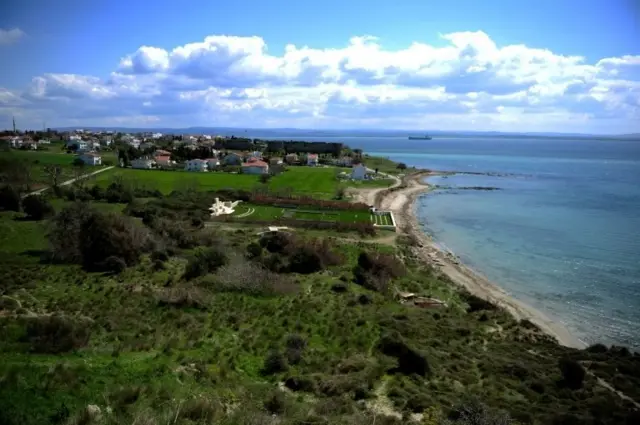 Image source, AFP
Image source, AFPWith the sun glinting off the water and lush forests dotting the peninsula, it's hard to imagine the horror that engulfed Gallipoli a century ago. Over nine months, the beaches became bloodbaths as Allied forces attempted their failed invasion. The anniversary is being marked by several ceremonies to remember the thousands of victims.
Prince Charles and Prince Harry started the day on HMS Bulwark, the Royal Navy's flagship. We were on board as they met veterans and descendants of the soldiers, hearing of heroism and of the intense fighting in 1915, when many troops were gunned down even before their boats landed on the beaches.
Joining the royals at the ceremonies are the prime ministers of Australia and New Zealand, for whose countries Gallipoli marked the birth of their national consciousness, fighting in major warfare for the first time as independent nations. Leading the ceremonies: the president of Turkey, which emerged from the ashes of the Ottoman Empire under Ataturk, a brilliant Gallipoli commander. It's a campaign remembered for different reasons by all sides.
 Phil Mackie
Phil Mackie
BBC News correspondent
tweets, external: Final rehearsals at Helles #Gallipoli100
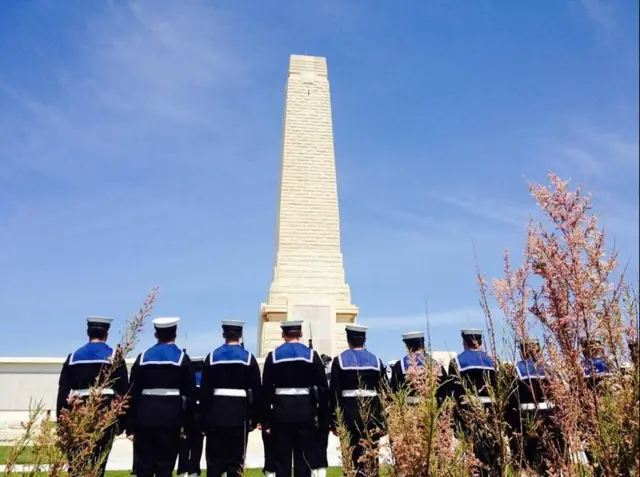
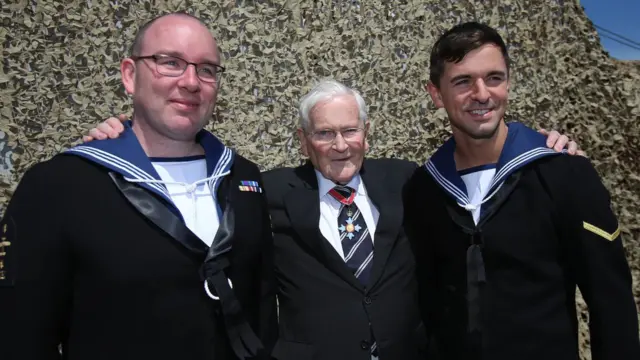 Image source, Niall Carson
Image source, Niall CarsonPrinces Charles and Harry, joined by First Sea Lord Sir George Zambellas, have met descendants of those who served in the doomed campaign.
Roger Boissier, 84, from Armathwaite near Carlisle, was honouring his father Ernest, who was awarded the Distinguished Service Cross while a Lt Cdr at Gallipoli.
Sir James Dunbar-Nasmith, 88, from Findhorn, Moray, said his father Martin - who won a VC commanding submarine raids through the Dardanelles Strait - did not talk to him about his exploits, so he learned about his war record from school friends.
Lyn Edmonds's grandfather Pte Benjamin Hurt was a Royal Dublin Fusilier who fought at Gallipoli.
She has tried to increase knowledge of Britain and Ireland's contribution to the campaign: "I still think we have a long way to go to dispel a lot of the myths".
Tony Abbott
Prime Minister of Australia
tweets, external: Thank you to the Capt & crew of HMAS ANZAC for hosting me on the eve of #ANZACDAY #ANZAC100
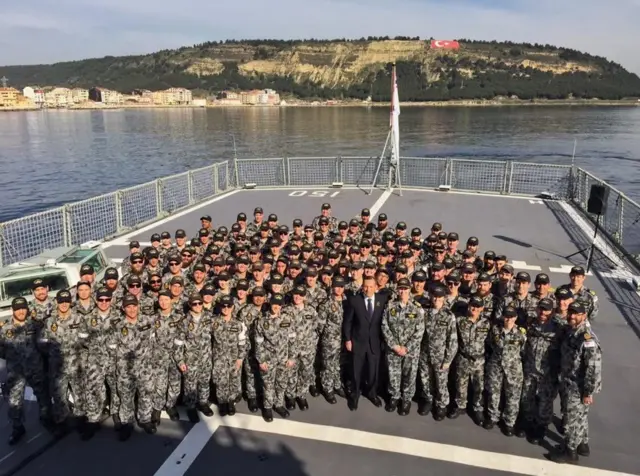 Image source, @TonyAbbottMHR
Image source, @TonyAbbottMHRJohn Key
New Zealand prime minister
tweets, external: At Chunuk Bair, an emotional site that is permanently etched in our memories.
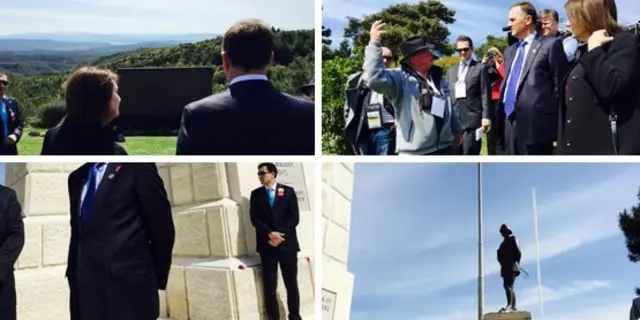 Image source, @johnkeypm
Image source, @johnkeypm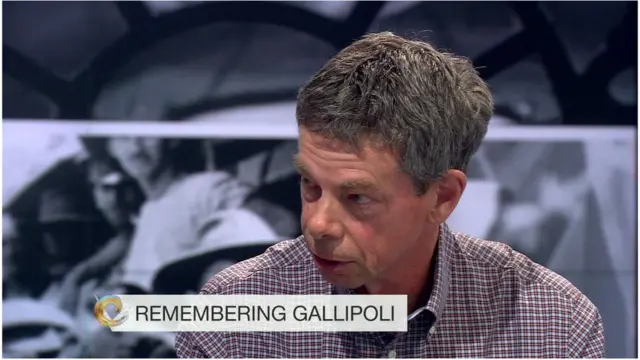
Former BBC foreign correspondent Peter Biles has been speaking to Victoria Derbyshire about his grandfather.
One hundred years ago today, Harry Biles of the Royal Navy Division was heading for Gallipoli on the Royal George. You can read his daily diary here., external
The day before he had attended the funeral of his friend, the poet Rupert Brooke - who reportedly died of septic pneumonia - on the Greek island of Skyros.
His diary entry for 24 April 1915 reads: "Sailed from Skyros at 5.30 am for landing at the Dardanelles. Under escort. Transports formed into 3 divisions... French Hospital Ship also accompanying.
"Passed Soudan about 9.30 am. Weather bright but choppy."
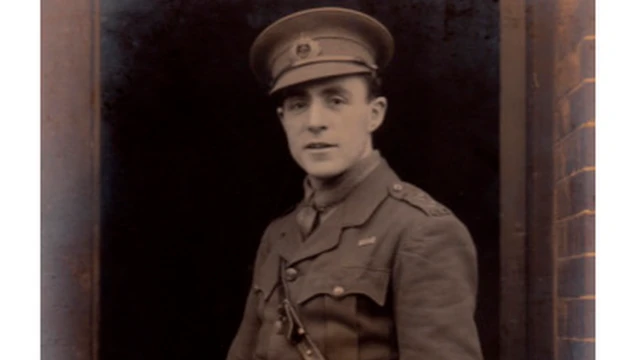 Image source, @peterbiles
Image source, @peterbiles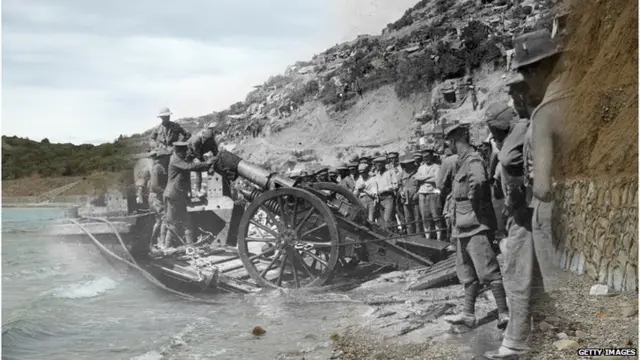 Image source, Getty Images
Image source, Getty ImagesTroops at Anzac Cove
The Allies had failed to gather enough intelligence about the terrain and climate at Gallipoli, underestimated the Turkish forces and suffered from uninspired leadership.
The Allied forces only managed to advance a few miles inland despite showing immense bravery and losing tens of thousands of men. Gallipoli was effectively a costly sideshow.
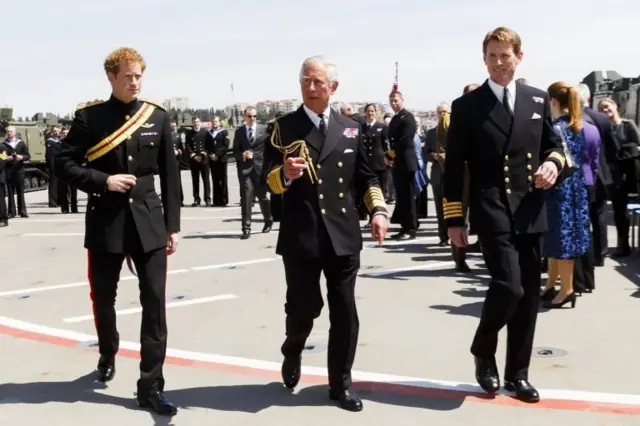 Image source, Getty Images
Image source, Getty ImagesThe Prince of Wales and Prince Harry are representing the Commonwealth during two days of Gallipoli centenary events.
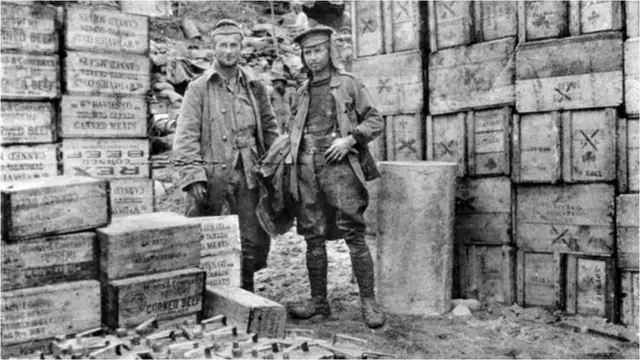 Image source, AWM
Image source, AWMTwo soldiers with boxes of corned beef, known as bully beef
There was little variety in the food rations. Corned beef and dry biscuits, external were a staple, supplemented with bacon, cheese and jam. Fresh water had to be shipped in from Egypt and was strictly rationed during the scorching summer.
Swarms of flies carried infection from latrines and unburied corpses to food in mess tins. Disease and dysentery were rife among soldiers.
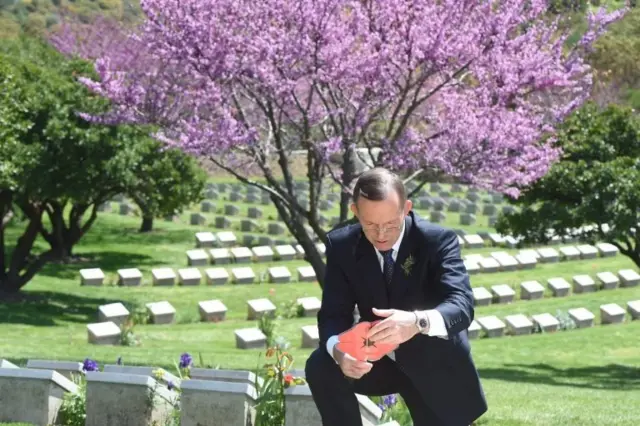 Image source, EPA
Image source, EPAAustralian Prime Minister Tony Abbott reads messages left at Shrapnel Valley Cemetery for Anzac fatalities in the Gallipoli campaign.